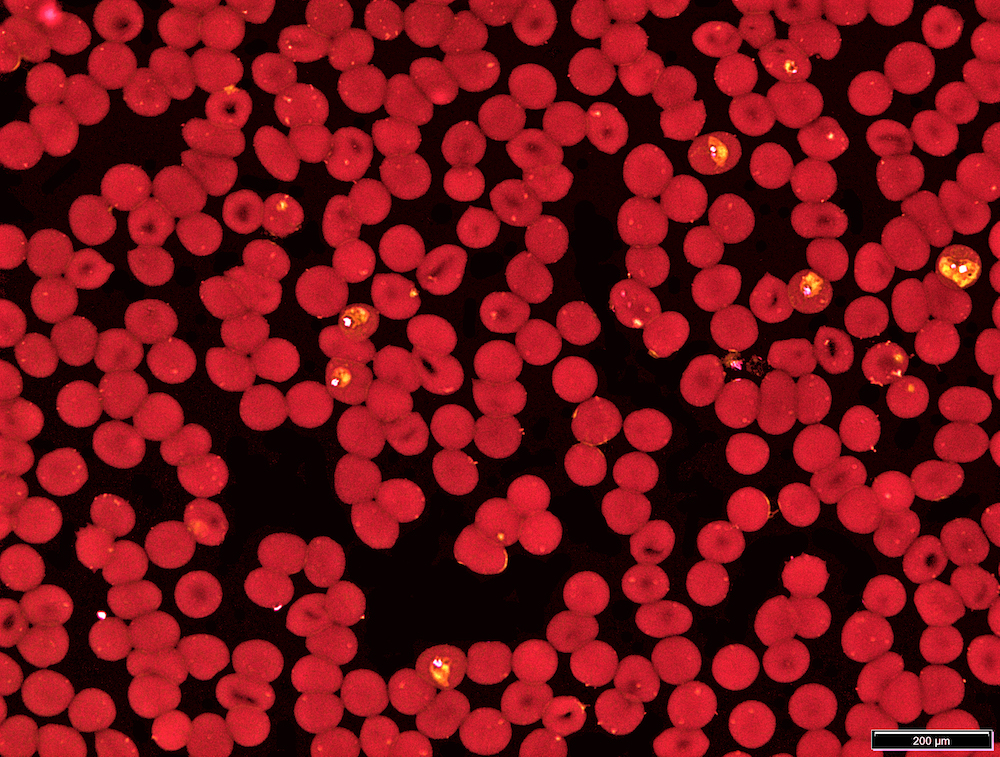An AI-driven, visual detection model developed by KAUST startup Thya Technology tackles large image datasets for clients
When KAUST bioscientist and doctoral student Zenaida (Zena) Stead is working with hundreds of blood cultures and needs to know the ratio of healthy red blood cells to those infected with malaria, accuracy is key. Manually counting thousands of red blood cells to determine this, however, is time consuming, labor intensive and prone to error. To expedite her project, she turned to KAUST-based startup Thya Technology for help.
The AI-powered, computer vision company features sophisticated detection models using machine learning algorithms capable of rapidly analyzing hundreds and thousands of images based on data annotation and select criteria, in this case, red blood cells — a process that significantly saves time, labor and money.
“Access to Thya Technology has been a game changer for my research,” said Stead. “I only wish the technology had been out sooner so that I could have used it when I first started my project and was manually counting red blood cells. Now that this task is automated using Thya Tech’s model, I can devote more of my time to other areas of my research.”
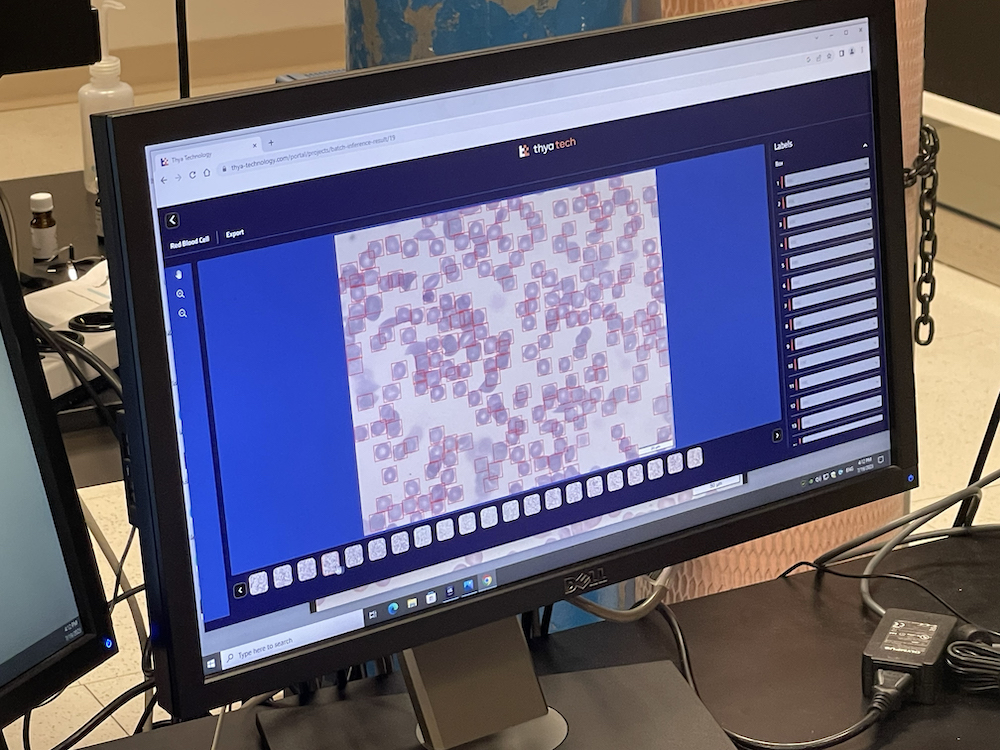
Stead is one of many diverse end users who are benefitting from Thya Tech solutions. The company’s AI-based technology can be applied to thousands of other cases in diverse areas such as agriculture, neuroscience, marine science, plant science, Earth imaging and urban planning.
Thya Technology has recently launched their no-code, user-friendly cloud-based platform for anyone with image datasets to use for “click-of-a-button” analysis, with automated, accurate results delivered by its smart algorithms.
The company’s journey to achieving high-technology readiness and high throughput — industry terms that define a company’s maturity and ability to deliver thousands and even millions of consistent, reliable results — involved a winning integration of academics and entrepreneurial know-how.
A business germinates
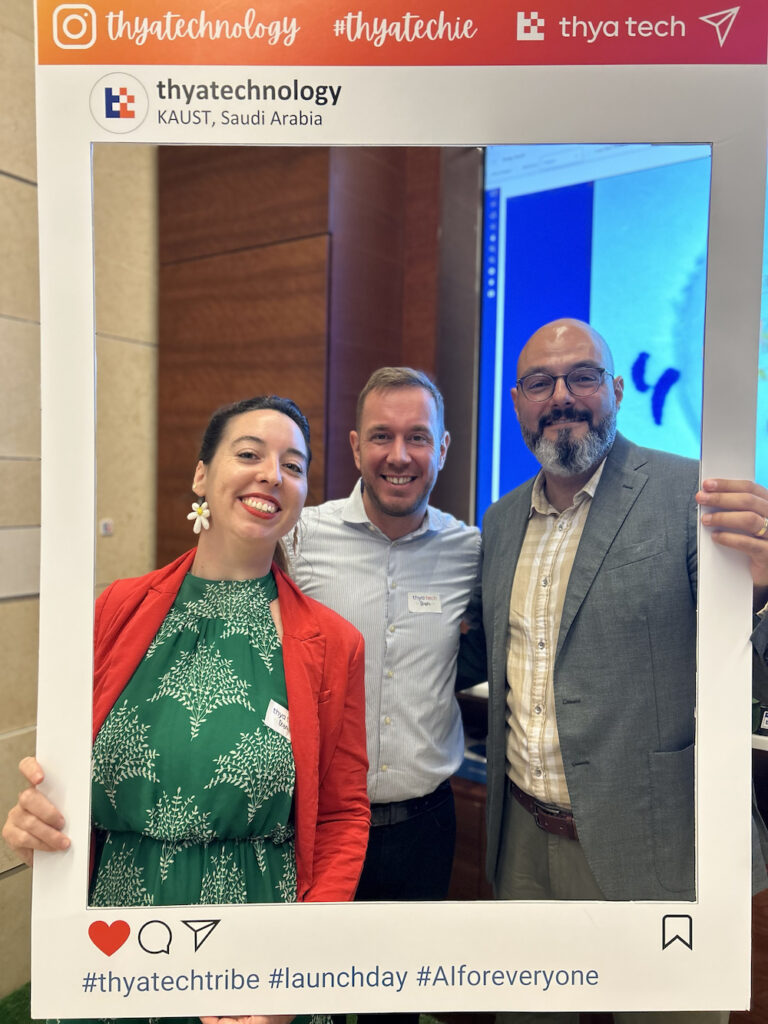
Thya Technology founders — KAUST alumna (PhD ’21) and CEO Dr. Justine Braguy; CTO Dr. Silvio Giancola, KAUST research scientist working in computer vision; and Professor Bernard Ghanem, Thya Tech advisor and AI- computer vision expert and principal investigator of the KAUST Image and Video Understanding Lab — said the idea for the company fell into place as a result of recognizing a need for the tool to help researchers on campus.
In 2019, Giancola and Ghanem had been approached by multiple scientists for image-based solutions to similar challenges, such as identifying and counting the spines of dendrites in brain neurons, and fish species in coral reefs.
“The nature of the projects and data differed, but the desired solution was essentially the same — a machine learning model was needed with algorithms that could rapidly analyze large datasets,” Giancola said.
A catalyzing moment came when Braguy, then a PhD student in plant science under the supervision of Dr. Salim Al-Babili, approached Giancola for a solution that could save her time from counting thousands of tiny Striga seeds by hand as part of a hormone study on rice plants. Giancola mobilized a plan to develop an AI model that could not only handle Braguy’s projects, but potentially others, as well.
After a year of trial and refinement — training the machine to recognize and differentiate criteria based on labeling and annotating images of plant seeds in various stages of germination — Giancola devised a program that counted the Striga seeds automatically and accurately based on still microscope images. What would have taken days to accomplish manually could now be done in hours. The project resulted in a co-authored paper published in the journal, Plant Physiology.
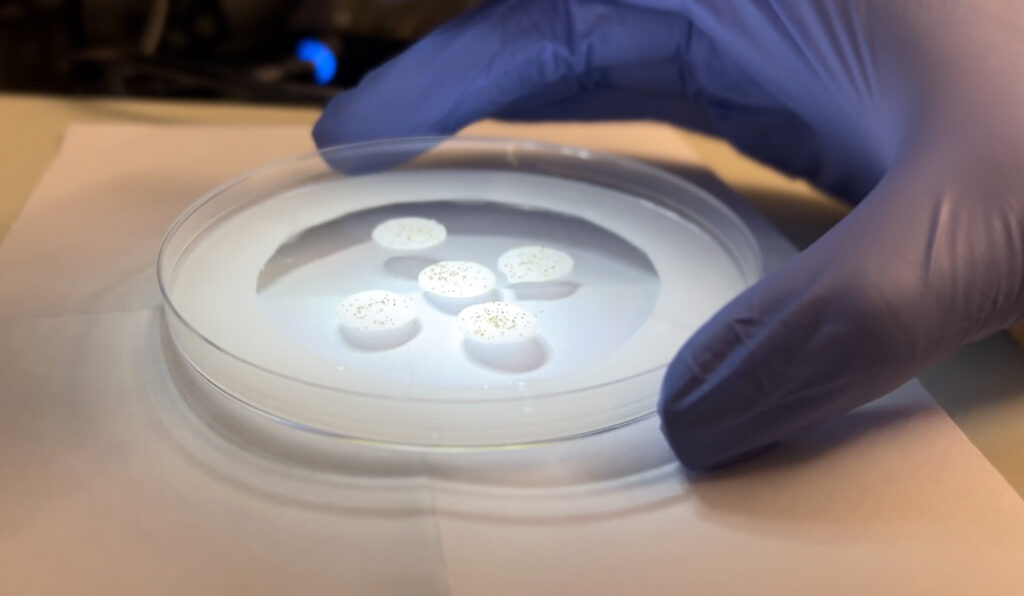
“As a researcher, there’s pride in developing an AI tool that can serve humanity and the greater good, in this case, helping to identify and manage germinating seeds to enable more crops to grow,” said Giancola. “But it took a team of software developers, research engineers, business mentors and many others to achieve this.”
The potential of the tool for research was clear, but could the model be marketable beyond the lab and in the real world?
“We were not only impressed by how easy-to-use and how accurate the system’s results were; we were also excited by the realization that the tool could be an invaluable tool to others, helping them reach goals sooner and with greater precision,” said Braguy.
Buoyed by the success of the research paper, Giancola, Braguy and Ghanem joined forces to refine and commercialize their proof-of-concept technology so that others could customize and use the model based on their own data. But to do this, the academics needed to learn the ropes of entrepreneurship.
From academics to entrepreneurs
The KAUST startup accelerator program TAQADAM gave the budding startup the needed building blocks for success. The team entered the six-month TAQADAM in 2022 as Thya Technology, named after the Greek goddess of vision, Theia, and emerged from the program with a business plan, industry knowledge and tactical strategies, ultimately competing alongside thousands of contenders from around the world to win the competition with an Impact Acceleration Award of $140K along with nine other startups selected from among the 40 semi-finalists and 20 finalists — the only KAUST startup in the group.
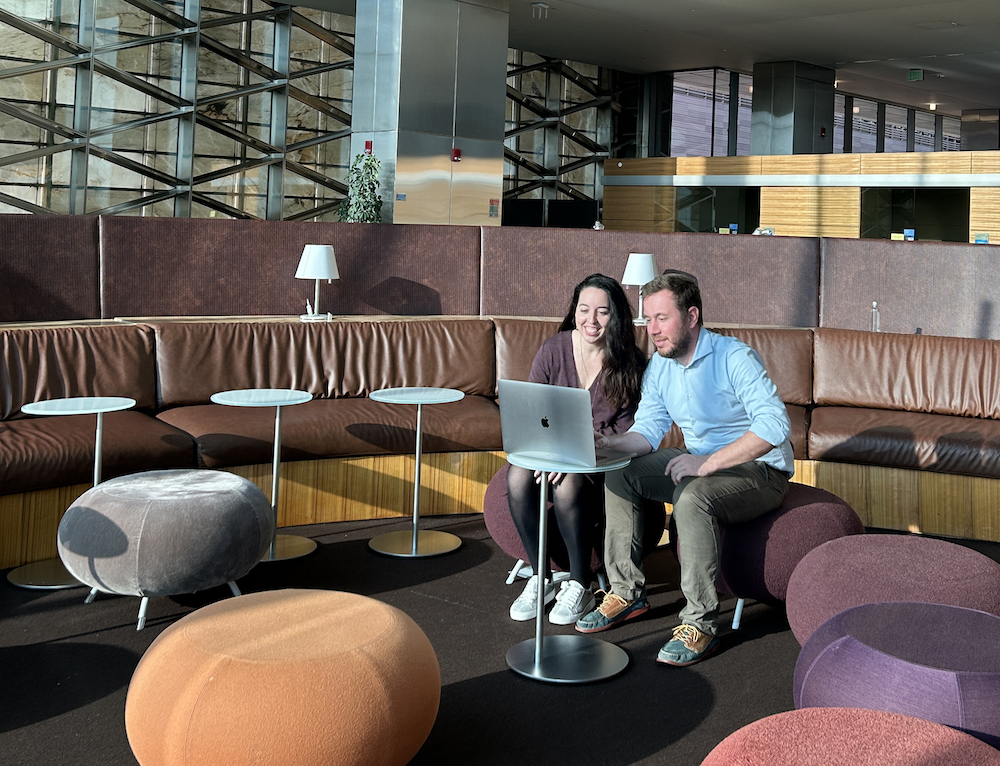
Equipped with newfound business skills, protected intellectual property, translational seed money from KAUST, and an office in the KAUST Research & Technology Park, the team had the means to boost their detection model to scale. They used the money from TAQADAM and KAUST Innovation to incorporate, build a team, setting up bank accounts, hiring a lawyer, interns and, importantly, research engineers and a software engineering company, IdeatoLife, to help them with e-commerce performance, and to scale the platform to the Cloud so that 100, 1000 or 10,000 users could use it at the same time.
Giancola said the process of participating in TAQADAM was eye opening: “There’s a big gap between research that’s performed in a lab and developing a technology that can be used in business. A completely different set of skills is required.”
He said that Braguy brings the ideal balance between academia and business to the team as CEO. “She quickly grasped the business strategies communicated at TAQADAM and applied these to the company. And as a researcher, she understands the need for the AI platform and its useability, which informs her business decisions and interactions with clients.”
Braguy said it’s been interesting to see how fast they’ve adapted and learned. “Our academic background helped us develop a solid proof of concept, but running a business brings a whole new vocabulary. I continue to learn so much from other startups in the KAUST Innovation community: we are not competitors, as we are from different industries, so we really support each other.”

Ghanem added, “As researchers, we’re focused on being at the forefront of creating the best algorithms and techniques, and we tend to wait until a product is perfect before we publish. But in business, it’s all about taking risks and refining the technology as you go.”
New directions
“Some see AI as synonymous to magic,” said Ghanem. “It’s not magic. At the heart of any good AI model is quality data — made by the research behind it, its acquisition, management and cleanup. This, by far, is the most essential ingredient to the success of a system.”
Because Thya Tech’s model has been groomed on good data, it’s adaptable to multiple end user applications.
Ghanem’s network of international and in-Kingdom contacts has been instrumental in attracting new industry clients. For example, the team has been collaborating with the Saudi Ministry of Culture to analyze satellite photography of ancient stone structures and archaeological sites, with the model able to process two million images in approximately five hours.
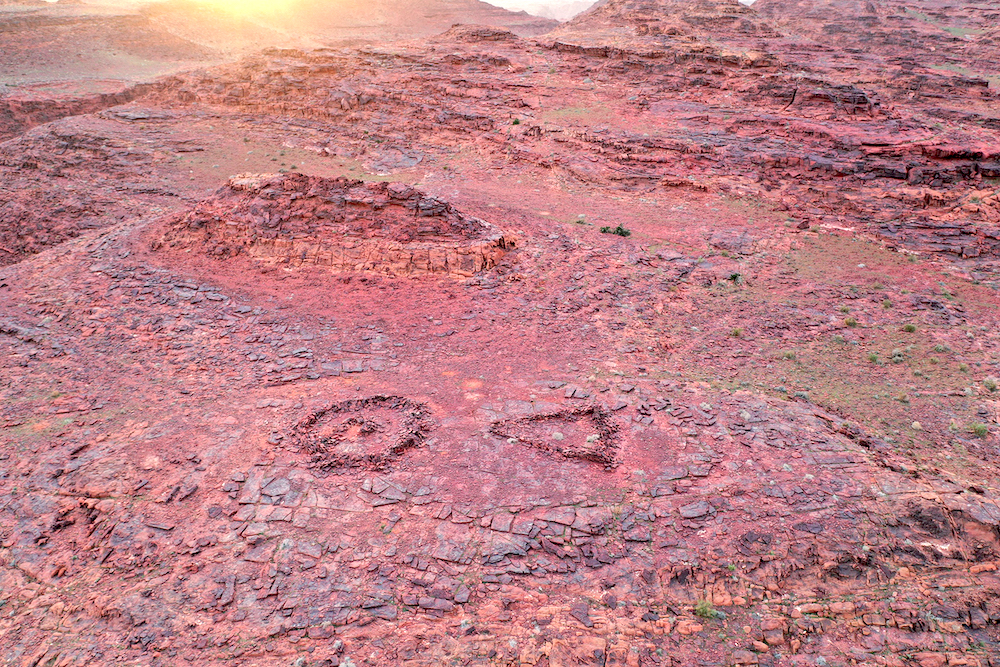
“The key is making people in government, industry private and public sectors aware that such a technology exists,” Ghanem said. “AI is not plug and play yet. Thya Tech’s ‘no-code platform’ does the work for you.”
Braguy added, “The new Cloud-based platform is a boon because anyone can use it — clients upload their pictures, label different objects they want to detect, and, after a few hours they have their detection model, ready to be used.”
Thya Technology is further developing their model for broader applications, including aerial footage — “horizontal” imagery that, similar to drone footage, Giancola said will require a different technical setup and approach from what’s used to process traditional “vertical” images (from camera or smartphones).
KAUST Innovation resources will continue to shape the development of the product.
“It’s a symbiotic relationship,” said Ghanem. “The more Thya Tech grows, the more innovation grows, and KAUST grows with it.”

